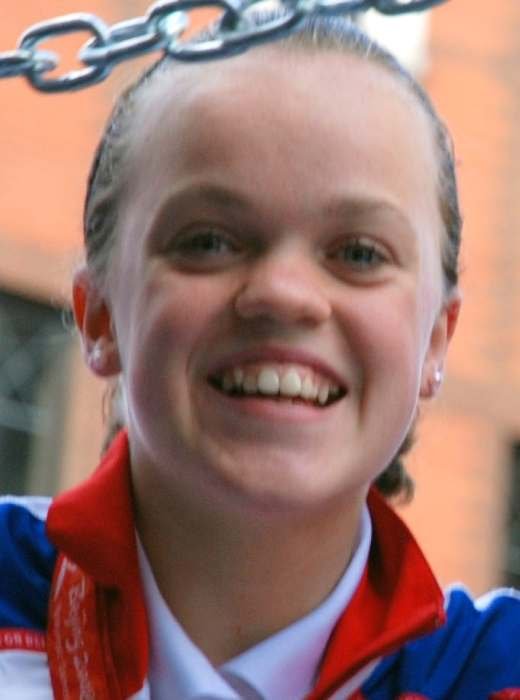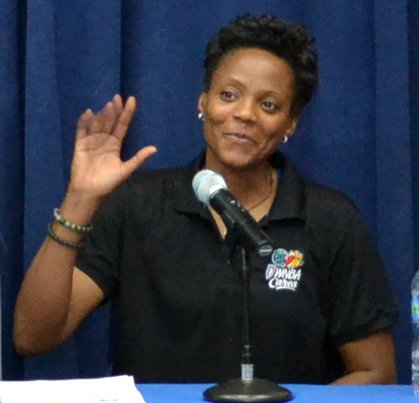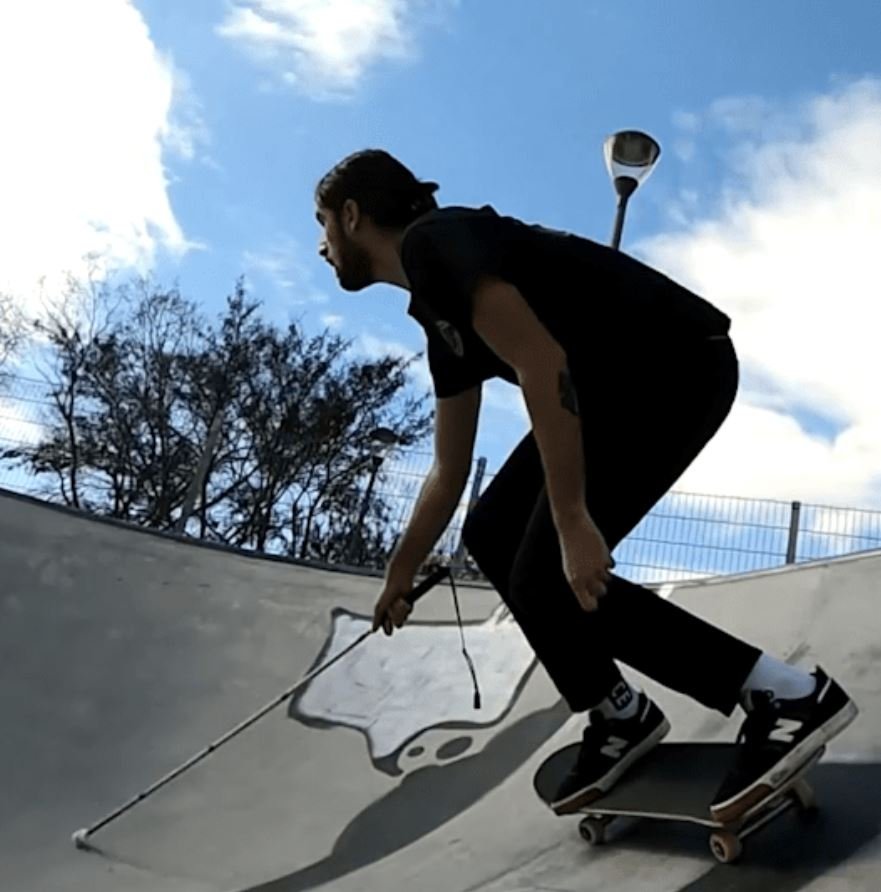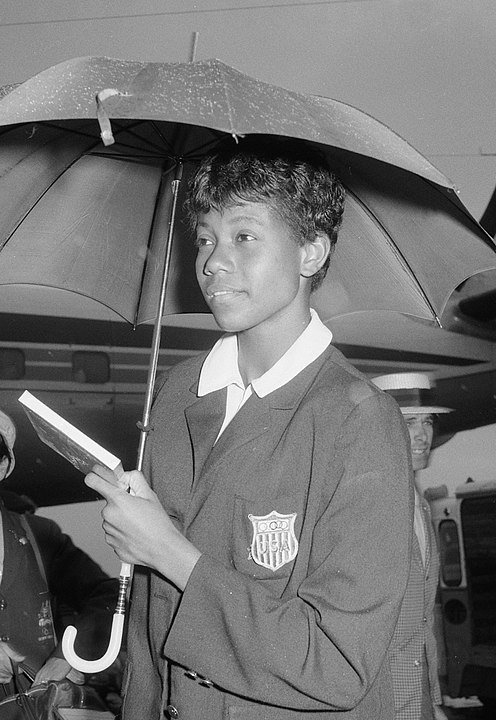“The water doesn’t care how tall you are, how old you are, or what your body looks like. The water only cares how hard you’re willing to work, how much you’re willing to give. And I was always willing to give everything.” – Ellie Simmonds
In the sweltering Beijing air of September 2008, a 13-year-old girl from the West Midlands of England stood on the starting block, her 4-foot-1 frame poised with the coiled energy of an athlete in her prime. The stadium buzzed with anticipation, but for Eleanor May Simmonds – Ellie to the world – the roar of the crowd had faded to white noise. As the youngest athlete on Team GB, she wasn’t supposed to medal. She wasn’t supposed to be here at all. But nobody told Ellie that.
When she touched the wall at the end of the 100m freestyle S6, the scoreboard confirmed what the erupting crowd already knew: the teenager had just become a Paralympic champion. Four days later, she’d do it again in the 400m freestyle. The girl who’d watched the Athens Paralympics just four years earlier, dreaming impossible dreams, had not only made it to the Games – she’d conquered them.
“Beijing… I had the best games ever,” Simmonds would later recall. “I swam as fast as I could. I remember doing heats and finals and getting personal bests.”
But to understand the magnitude of what happened in that Beijing pool, you need to know where Ellie Simmonds came from – and the waters she navigated to get there.
Early Life: The Beginning of an Unlikely Champion
Born on November 11, 1994, in Walsall, Ellie entered the world with achondroplasia, the most common form of dwarfism. Within weeks, she was adopted by Steve and Val Simmonds, joining their already bustling household of three daughters and a son. What might have been considered by some as a challenging start became, in the Simmonds family, just another chapter in a household defined by love and unwavering support.
The water became Ellie’s domain early. At five years old, her parents enrolled her in swimming lessons – not with Olympic dreams, but with the modest hope of building confidence. They couldn’t have known they were witnessing the first strokes of a journey that would rewrite Paralympic history.
By eight, little Ellie was competing against able-bodied children, holding her own with a determination that would become her hallmark. Two years later, her talent couldn’t be ignored – she was selected for the British Swimming talent programme, a pivotal recognition that set her on the path to elite competition.
Then came the moment that crystallized her ambition. Watching the 2004 Athens Paralympic Games on television, 10-year-old Ellie saw British swimmer Nyree Lewis claim gold. Something clicked.
“That was when I was really saying, ‘Oh man, I really want to go to a Paralympics, I want to get a gold medal,'” Ellie recalled years later. Simple words that would prove remarkably prophetic.
Finding Her Stroke: From Local Pools to Team GB
When genuine talent meets opportunity, families often face life-altering decisions. For the Simmonds family, that moment came when Ellie was just 11. Recognizing their daughter’s exceptional potential, Ellie and her mother made the monumental decision to relocate to Swansea, leaving behind family, friends, and familiarity to access world-class training facilities.
It was no small sacrifice – not for Ellie Simmonds , uprooted from her childhood home and friends, nor for her mother, who temporarily lived apart from her husband and other children. Yet this willingness to go all-in on Ellie’s talent speaks volumes about the foundation of support that underpinned her success.
In Swansea, Ellie connected with coach Billy Pye, beginning a partnership that would prove transformative. Pye saw beyond her small stature to the champion within, creating a training environment where Ellie could flourish not as a swimmer with dwarfism, but simply as an elite athlete with extraordinary potential.
The results came quickly. At just twelve years and three weeks old, Ellie became the youngest member of the senior British Swimming squad for the 2006 IPC World Championships in Durban. She didn’t medal, but the experience was invaluable – her first taste of international competition, a preview of what was to come.
Beijing 2008: A Paralympic Star is Born
Fast forward to September 2008. The Water Cube in Beijing. The Paralympic Games.
To say Ellie Simmonds arrived as an underdog would be an understatement. At 13, she was Team GB’s youngest athlete – a girl competing in a woman’s world, carrying dreams larger than her years. What unfolded over those September days wasn’t just surprising; it was seismic.
First came the 100m freestyle S6. Ellie swam with the fearlessness of youth and the precision of a veteran, touching home first to claim gold. Four days later, in the 400m freestyle S6, she did it again. The British media dubbed her “the golden girl of the pool,” a nickname that would stick through an illustrious career.
The images are indelible: this diminutive teenager climbing to the top step of the podium, gold medal gleaming against her Team GB kit, face alight with joy and disbelief in equal measure. Back home, a nation fell in love.
The accolades followed in torrents. BBC Young Sports Personality of the Year in 2008. Then, in February 2009, at just 14 years and 50 days old, Ellie became the youngest person ever to be appointed a Member of the Order of the British Empire (MBE) – a historic recognition of her historic achievement.
“Beijing was where the dream started to become a reality,” Ellie would later reflect. “I never expected to win gold, let alone two.”
But this was just the beginning.
London 2012: The Coronation of a National Hero
If Beijing was Ellie’s introduction to the world stage, London 2012 was her coronation. Now 17 and no longer an unknown quantity, she arrived at her home Paralympics as the face of British para-swimming, carrying expectations that would crush many athletes twice her age.
The pressure was immense, but Ellie had been preparing for this moment for four years. When she dived into the London Aquatics Centre pool, she wasn’t just swimming against her competitors – she was racing against history, against expectation, against the weight of a nation’s hopes.
She delivered. Spectacularly.
Two more gold medals – in the 400m freestyle S6 and 200m individual medley SM6 plus a silver in the 100m freestyle S6 and bronze in the 50m freestyle S6. Four events, four medals, two world records. The home crowd roared with every stroke.
“That was one of the best Games that I ever had,” Simmonds recalled. “I had personal bests in heats and finals.”
What made London special wasn’t just the medals – it was what Ellie Simmonds represented. In the afterglow of the most successful Paralympics ever staged, she emerged as the embodiment of a new era in disability sport, one where athletes were celebrated for their exceptional abilities rather than defined by their disabilities.
The Royal Mail even painted two postboxes gold in her honor – one in her hometown of Aldridge, another in Swansea. It was a small tribute, but a telling one: Ellie Simmonds had become a national treasure.
Post-London Successes: Golds, Growth, and Grit
Success at the highest level isn’t a destination – it’s a daily choice, a grind of early mornings, endless laps, and constant sacrifice. For Ellie, the years following London 2012 tested her resolve in new ways.
The accolades continued to accumulate: more gold medals at World Championships in Eindhoven 2010 and Montreal 2013; European Championship triumphs in Berlin 2011 and Eindhoven 2014. She was elevated to Officer of the Order of the British Empire (OBE) in 2013, another recognition of her growing legacy.
But behind the medals and honors, Ellie Simmonds was evolving – both as an athlete and as a young woman navigating her twenties in the unforgiving spotlight of fame.
“People see the medals, the smiles on the podium,” she once observed. “They don’t see the mornings when you can barely drag yourself out of bed, when every muscle screams, when you question why you’re doing this.”
Rio 2016: Resilience in the Face of Challenge
By the time the Rio 2016 Paralympics arrived, Ellie was no longer the wide-eyed teenager of Beijing. At 21, she was a veteran of two Paralympic Games, facing younger competitors hungry for their own breakthrough moment.
Rio tested her in new ways. The environment was challenging – Ellie later described it as a “really negative place” concerning some team dynamics. Yet once again, when it mattered most, she delivered: gold in the 200m individual medley SM6 (becoming the first S6 swimmer to break the three-minute barrier) and bronze in the 400m freestyle S6.
The medals were impressive, but perhaps more telling was her resilience – the ability to perform at her best when circumstances were far from ideal. It’s a quality that defines great champions, this capacity to find a way when the way isn’t clear.
Tokyo and Retirement: A Graceful Final Lap
After Rio, Ellie stepped away from swimming for a year – a necessary reset after years of unrelenting training and competition. Many wondered if she’d return at all. She did, but swimming was no longer her sole focus. She pursued a psychology degree at Loughborough University, expanding her horizons beyond the pool.
The Tokyo Paralympics, delayed to 2021 by the COVID-19 pandemic, would be her final competitive chapter. Now 26, Ellie Simmonds faced her toughest challenge yet – a new generation of swimmers who had grown up idolizing her, studying her techniques, and training specifically to beat her records.
For the first time in her Paralympic career, Ellie didn’t medal, finishing 4th in the 100m breaststroke SB6 and 5th in both the 200m individual medley SM6 and 400m freestyle S6. But focusing on those results misses the more significant achievement: competing at the highest level across four Paralympic Games, spanning 13 years – a remarkable display of longevity in a sport that typically favors youth.
After Tokyo, Ellie Simmonds confirmed her retirement from competitive swimming. It was, in many ways, a perfect full circle – from the wide-eyed 13-year-old in Beijing to the accomplished 26-year-old in Tokyo, she had given everything to her sport and changed it forever in the process.
Beyond the Pool: Advocacy, Media, and Identity
Retirement hasn’t meant disappearing from public life – quite the opposite. Ellie has embarked on a successful second act that has, in many ways, expanded her influence beyond swimming.
In 2022, she captivated audiences as a contestant on BBC One’s Strictly Come Dancing, reaching Week 7 with partner Nikita Kuzmin. Her participation brought disability representation to Saturday night primetime television, challenging perceptions and inspiring viewers.
“Disability representation is so important on a show like this,” she explained, “and I’m honoured to do it for the dwarfism community.”
She’s transitioned smoothly into broadcasting, presenting for BBC Sport at events including the Birmingham 2022 Commonwealth Games. Her television resume continues to grow, with appearances on The Great Celebrity Bake-Off, Saturday Night Takeaway, and other popular shows.
Perhaps most significantly, in 2023, Ellie made the deeply personal documentary Ellie Simmonds: Finding My Secret Family, exploring her adoption journey and meeting her birth mother for the first time. The program won Best Single Documentary at the 2024 British Academy Television Awards, resonating with audiences for its honest portrayal of identity, belonging, and reconciliation.
The documentary revealed painful truths – that Ellie Simmonds had been given up for adoption partly because of attitudes toward dwarfism at the time. Learning that she had been described as potentially “evil” or “stupid” because of her condition was devastating, but characteristic of her resilience, Ellie refused to be defined by others’ perceptions.
“I think it’s really helped that finding out who I am, looking at someone who birthed me, the nature that I’m from and the questions I had to ask her and she answered them – it makes you a bit more whole,” she reflected.
Ellie Simmonds’ Legacy: Changing the Face of Disability Sport
What makes Ellie Simmonds’ story remarkable isn’t just the medals or records, impressive though they are. It’s the journey – from a child given up for adoption to a national treasure who changed perceptions of disability sport forever.
Her influence extends far beyond her own achievements. Swimmers like Maisie Summers-Newton, who succeeded her as Paralympic champion in the 200m individual medley SM6, and Ellie Robinson cite Simmonds as their inspiration. Her impact crosses Paralympic disciplines – Olivia Broome, a bronze medalist in Para powerlifting at Tokyo 2020, was inspired by watching Simmonds compete in Beijing 2008.
As a patron of the Dwarf Sports Association UK, Simmonds actively supports individuals with dwarfism in their sporting pursuits. Her ambassadorial roles with The Scout Association, Girlguiding, The Prince’s Trust, and WaterAid speak to her commitment to giving back.
Through it all, Ellie has maintained the philosophy that guided her from those first swimming lessons at age five: “Work hard and be yourself.” Simple words that carry profound wisdom.
“I don’t see it as a disability,” she once said of her dwarfism. “I’m just a normal person, but a bit smaller than everyone else.”
That perspective – refusing to be limited by others’ expectations – is perhaps Ellie Simmonds’ greatest legacy. From the moment she dived into that Beijing pool as a 13-year-old to her current role as a broadcaster and advocate, she has consistently demonstrated that perceived limitations often exist only in the mind.
In a world obsessed with physical ideals, Ellie Simmonds showed us something more important: the immeasurable power of heart, determination, and unshakeable self-belief.
The golden girl of the pool may have hung up her competitive goggles, but her influence continues to ripple outward, touching lives far beyond the confines of Paralympic sport – a true champion, in every sense of the word.
If Ellie Simmonds’ journey moved you, you’ll want to meet another unstoppable force in the water. The Rocket Man: Gabriel Araújo’s Triumph Over Adversity tells the equally powerful story of Brazil’s Gabriel Araújo – a fellow Paralympic champion who, like Ellie, turned challenge into triumph and became a symbol of resilience for a new generation.
Photo: By allen watkin from London, UK – File:Louise_and_Ellie_Simmonds_(2947945888).jpg, CC BY-SA 2.5,




